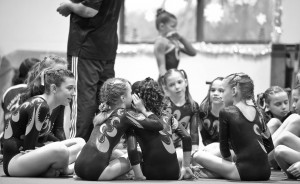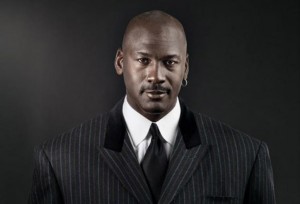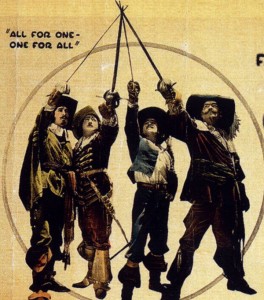MOST Influential People in Gymnastics
Who are THE MOST INFLUENTIAL PEOPLE in Gymnastics?
I was recently reading TIME Magazine and their annual issue on The Most Influential People in The USA. It got me thinking, there are so many influential people in the Gymnastics World, but how do we decide who are the MOST influential.
Submit your votes for the MOST INFLUENTIAL PEOPLE IN GYMNASTICS.
You can submit as many times as you want. I will announce the most influential people in an upcoming post at the end of April.
Commitment to the Team.
 Each of us must be committed to maintaining the reputation of all of us. And all of us must be committed to maintaining the reputation of each of us.
Each of us must be committed to maintaining the reputation of all of us. And all of us must be committed to maintaining the reputation of each of us.
—Jim Rohn
This was such a profoundly simple statement that I felt it deserved it’s own blog post. Imagine if this was the mantra that your team followed in and out of the gym.
I found this quote on Sefu Bernard’s Blog. He is a basketball coach in the Toronto Raptors organization. Something that I have figured out is how much all coaches really have in common whether they are on a court or in a gym.
Or in other words:
Preparing for the End of the season
 As we prepare for the end of the season I am reminded that Gymnastics is not a test you can cram for. To really be successful in gymnastics you need to prepare well and prepare early. In the final weeks or month of a season you may be able to save a tenth here or there but you are not going to make any HUGE changes to routine. In a recent USECA newsletter, Dr. Sands expresses his enthusiasm for the upcoming Olympic Games and the dramatic routines and skills athletes from the USA are doing. At recent International competitions athletes from the USA have shown a superior level of difficulty and execution. Dr. Sands goes on to warn:
As we prepare for the end of the season I am reminded that Gymnastics is not a test you can cram for. To really be successful in gymnastics you need to prepare well and prepare early. In the final weeks or month of a season you may be able to save a tenth here or there but you are not going to make any HUGE changes to routine. In a recent USECA newsletter, Dr. Sands expresses his enthusiasm for the upcoming Olympic Games and the dramatic routines and skills athletes from the USA are doing. At recent International competitions athletes from the USA have shown a superior level of difficulty and execution. Dr. Sands goes on to warn:
Sadly, If history repeats itself (and it tends to), we will likely lose 2 to 3 of our best athletes due to injury on the way to the Olympic Games. Coaches and athletes – think twice and then twice again when performing while fatigued. Get prepared early. Past data showed that coaches tended to wait too long to prepare and thus increased the fatigue and instability of performances by doing so. Don’t get caught; establish your routines early so that you can concentrate on perfection and specific fitness as you approach the Trials and Games.
All too often I have heard coaches talk about the skills they are going to add to routines for States, Regionals or Nationals. The real conversation should be about what skills they are going to TAKE OUT.
It may be too late for this year but you can lay the base for next year NOW. I am certainly NO expert, I have made thousands of mistakes (and I like to believe that I have learned from MOST of them). With that being said, here are my thoughts on a training plan for the year. Keep in mind that every situation is different. Every athlete is different. BUT, before you come up with more individual training plans you must have a general one.
September 1st. 110% of all skills needed for this years routines. Although landings can be “soft” the skill itself needs to be performed by the athlete without spot. Why 110%? Injuries and fatigue are reality in gymnastics. It is better to be over prepared and be able to take skills out if their routines then to try to add something. By Having MORE than what they need, they remain competitive at their level even when you take skills out.
End of October. All Routines onto competition surface. This doesn’t have to happen every day but my experience has shown me that if they are not doing it in a routine by this time of the year, they are not going to add it as you are now starting to focus on more and more routines.
End of November. Should have had 1st meet. Lots of difficulty, lots of falls. That is OK. Need to get the experience
Mid December (I use this as a date because I have a meet at my gym. Kids are comfortable, it is a cheap entry fee with no travel). Hardest difficulty of the year.
Beginning of January. We usually have a couple of meets in t first 1/2 of January. Because of Holidays and potential of snow days (yeah- we get those up here) workout can be a little inconsistent. These meets we start taking skills out of Routines and focusing on consistency of routines in practice and competitions.
February. In general, the routines that we are competing in February will be the routines we compete for the remainder of the season.
March Typically State Meet. My goal is to get the kids through the State Meet and to Regionals and Nationals without injury. We Train Hard. Nearly 100% focus on perfecting routines and consistency. I get pretty paranoid and really try NOT TO take any unnecessary risks in the gym. Even a twisted ankle at this point in the season could be disastrous. We try very hard to make every practice like a competition. Timed warm up etc.
April/ May– Level 9/10 Regional Championships and National Championships. Just be consistent in routines. Clean Landings. Good handstands. It may be boring for the kids so try to make things small contests.
After Nationals– 1 week of just easy drills in the gym. No risks. Then start to play with the skills that you took out of routines earlier in the year.
There are so many other factors that go into a “good year”. Nutrition, Conditioning, Time to Recover. This is just the tip of the iceberg. Good luck!
Have some thoughts and want to share your training plan? Keep the MOMENTUM going. SHARE
Why Coaches Seek Conflict
Male Coaches who say their female counterparts or gymnasts deliberately “pick fights” in the gym may be onto something.
A new study shows that in relationships, men feel best when they can tell that their partner is happy; women, on the other hand , are most content when their partners are upset or agitated, because the intensity of their emotions show they’re invested in the relationship. Researchers videotaped 156 married and unmarried couples discussing recent episodes that had upset them; then they had the couples watch the tape and answer questions about how they felt at different points. They discovered that “women tend to want to engage around conflict,” Massachusetts General Hospital psychologist Shiri Cohen tells NPR.
That’s because women feel most connected when they can tell that their partners are distressed- or when men understand that the women is suffering. Men, on the other hand, find conflict threatening, and feel best about their relationships when their partners are in a good mood.
How can both styles hope to coexist with out killing each other in the gym?
“The more men and women try to be empathetic to their partners feelings the happier they are”. Says Cohen.
That means that the women have to accept men when they are blithely happy (we’re pretty simple that way) while men must be willing to deal with women’s occasional need to be unhappy.
April Fools Day Pranks
I Have A Problem With My Coach. Part 2
I Have a Problem with my Coach Part 2
Dr. Joe Massimo & Dr. Sue Massimo
Excerpt from Psychology and Gymnastics by Drs. Joe and Sue Massimo.
Over the years, we have received hundreds of letters from gymnasts, coaches and parents concerning issues raised in our articles or other concerns of a “psychological” nature regarding our sport. In the majority of cases we answer these letters one by one and that has proven to be satisfactory. It is always nice to hear from readers and feedback, whether positive or negative, keeps a person on his or her toes.
On several occasions we have received a surprising number of letters, mostly from gymnasts, asking for help with a personal problem or with some special situation in their gym. Although all of our answers are of course confidential, enough letters have come in talking about similar difficulties in the gym of a general kind that we felt some type of larger response might be useful for more readers.
In any setting where people are striving for the kind of creative expression, as required in gymnastics, there are bound to be some problems. Since everyone is unique, with varied backgrounds and genetic dispositions, any given situation will be seen in a different way by each individual. It would be impossible to talk about all the various problems that might arise in a gym, and, because of our uniqueness, even more difficult to make suggestions that would always work for everyone. However, there are some basic issues that have continually been raised in our mail which many gymnasts apparently experience in common (individually or as a group) when it comes to their coaching situation.
In this article, we felt it would be valuable to consider a few of the more often raised issues or problems that gymnasts have written to us about. And yes, we’re talking about “The Coach.”
I HAVE A PROBLEM WITH COACH. Part 1
The Situation Where the Coach Plays to Favorites
We have never met a coach, who is honest with him or herself, who has not had to struggle with this natural tendency to have favorites. In all human relationships, people form stronger attachments with certain individuals, rather than others. Why should it be any different in the gym? Of course, sometimes coaches pay more attention to the most talented gymnasts. In other cases, it is not always a situation that occurs based on talent but can come about because of some other factors that are not easily identified. Whatever the basis, it makes for a tough situation when a single gymnast or group of gymnasts who are part of a team clearly feel that certain individuals are getting preferred attention on a regular basis. Occasionally, a particular gymnast, because of special skills being attempted or competitive level, must have extra help and time from the coach. Most coaches make this clear beforehand and indicate that this may be the case from time to time, and that each gymnast in their turn, as appropriate, will receive the same special handling. Some coaches may ignore certain gymnasts at particular times—this may not have anything to do with “playing favorites,” but may be intentional to encourage self-motivation and direction. This is perfectly acceptable and is usually temporary.
In the article, “Behavior Change: Part II- Self-Evaluation,” we describe the benefits of having gymnasts work with and encourage each other, rather than always relying on the coach. This is not only good practice, but can reduce the effect of special attention given to a single person (one should also remember that the person receiving the special attention that is overdone is in a spot in their relationships with other kids). If the “playing favorites” condition happens continually with the same one or two gymnasts at the sacrifice of the others, nothing short of confrontation will help. What we mean is that the other members of the group, as a group, must bring this to the coach’s awareness. If your coach is so domineering that he or she is too powerful, in your eyes, to be approached in this regard, then perhaps the only solution is to ask for adult assistance (e.g., parent). This is a suggestion we don’t like to make, since, as we have stated in other articles, such as “My Daughter the Gymnast,” we have strong feelings that parents should stay out of the coaching interaction. On the other hand, the condition we are speaking of is in the extreme, and when it is out of hand, it will be obvious and clearly destructive to all, and must come to an end. We started this discussion by saying we never met a coach who has not had to struggle with this issue—struggle is the key word. Most coaches try very hard to be fair with their time and give equal attention to individual gymnasts as needed. In the majority of cases, they succeed in their efforts. But sometimes, the best intentions go off, and the further it goes, the worse it gets. Group action is the best solution.
We would be amiss to say that if a gymnast feels he or she is being neglected, they should also carefully think about their own behavior. Few people, not even saintly coaches, can only take a pain in the neck for so long. It is as natural to turn away from obnoxious behavior as it is to be attracted to favorable characteristics. Make sure you don’t, in fact, bring about the so-called “neglect” out of your own “unpleasantness,” before you launch a campaign to change things.
The Negative Coach
There are some coaches that talk a good game, but who just cannot seem to think “positively.” They seem to always be putting the gymnast down with negative and/or sarcastic remarks. Often they yell a lot and even have temper tantrums from time to time. It surely is hard for a young gymnast to have a childish coach! The coach who operates out of a negative view of things often makes his or her gymnasts feel guilty for what they are doing or failing to do. In the worst of such conditions, gyms that have a negative atmosphere are very unhappy places to be. Some gymnasts adjust to it through willpower and personal drive—many, on the other hand, bow out of the sport with a bitter taste in their mouths. Some coaches seem to slip into a more negative mode close to meets when pressure is greatest—that is a different matter, but still a problem. When there are at least some positive things happening, most gymnasts can manage by accepting the negativism as part of the coach’s “style” one has to live with over time. For more on this issue see “Abuses of Anger in the Gym.”
Another method for coping with this type of situation is for the kids to pull together and provide the positive support to one another. Sometimes, this will give the coach a model for change which might rub off. Of course, doing this requires a kind of maturity among the gymnasts themselves and this is sometimes asking a lot. It may work for a few, and at least they will feel better in the setting. We are big believers in group influence and pressure—as in the case of the playing favorites coach, the ultimate action might be for the gymnasts to make a direct approach to the coach with the problem. Sometimes, this works and sometimes it doesn’t. In any event, it will be difficult for the coach to claim he or she was unaware of the problem, once it has come into focus. Coaches can easily dismiss an individual’s complaint, but it is a different matter when a group presents a case. Once this is out in the open, many coaches can alter their behavior. When they do, the results are usually so rewarding that they begin to modify how they operate on a more regular basis.
Summary
For the gymnast bringing these issues to your coach is the first step in resolving them. In these situations we have looked at for openers, there is one other approach that can be made. If you are in a gym with several coaches, it may be possible to bring the message to the “head person” through one of the other coaches who are not part of the problem. Often in multiple-coach gyms, certain youngsters feel more comfortable with one coach than another when it comes to getting at certain problems. It is not disloyal or inappropriate to take advantage of this condition as a possible way to bring about change which will make things better for everyone. As a coach, you must be open to look carefully at your own behavior and the effects it is having on the team or individual gymnasts in your charge. Appropriate behavioral changes must be made to ensure the overall health of your gymnasts.
Works Cited
Massimo, J. &. Massimo, S., (2012). Psychology and Gymnastics. NY, NY: Morgan James.
Massimo, J. & Massimo, S., (2012). “Abuses of Anger in the Gym,” in Psychology and Gymnastics, NY, NY: Morgan James.
Massimo, J. & Massimo, S., (2012). “Behavior Change: Part II- Self-Evaluation,” in Psychology and Gymnastics, NY, NY: Morgan James.
Massimo, J. & Massimo, S., (2012). “Coaching through Goal Setting” in Psychology and Gymnastics, NY, NY: Morgan James.
Massimo, J. & Massimo, S., (2012). “My Daughter the Gymnast,” in Psychology and Gymnastics, NY, NY: Morgan James.
Massimo, J. & Massimo, S., (2012). “My Goal is to…,” in Psychology and Gymnastics, NY, NY: Morgan James.
DRs Joe and Sue Massimo are in the final stages of editing Psychology and Gymnastics and it should be in Print Soon. This is a MUST READ for all coaches.
Ian Makowske- Team Mikey’s Way
Ian Makowske- Team Mikey’s Way
Despite all of the wonderful funds we’ve raised for your foundation, despite all of the great gymnastics that’s been supported, I know that it is important to remember the man behind it all.Happy birthday to Mikey Friedman! Your family and friends miss you terribly and love you more. To be honest I’d trade the past months of wonderful experiences training and competing for Team Mikey’s Way just to sit down and have a talk about Physics or play some tennis with you. And I hate Physics.
Thank you for all whom you’ve helped, for all whom you’ve inspired, and for all that you still are. Though it sometimes seems small comfort when faced with your absence, we can all remember not only all that you did, but the great friend and great person and great presence in our lives that you still are. Happy Birthday, Mikey! I’m proud to call myself your friend.
Get involved with Mikey’s Way and TEAM MIKEY
I HAVE A PROBLEM WITH MY COACH part 1
I Have a Problem with my Coach
Dr. Joe Massimo & Dr. Sue Massimo
Excerpt from Psychology and Gymnastics by Drs. Joe and Sue Massimo.
Over the years, we have received hundreds of letters from gymnasts, coaches and parents concerning issues raised in our articles or other concerns of a “psychological” nature regarding our sport. In the majority of cases we answer these letters one by one and that has proven to be satisfactory. It is always nice to hear from readers and feedback, whether positive or negative, keeps a person on his or her toes.
On several occasions we have received a surprising number of letters, mostly from gymnasts, asking for help with a personal problem or with some special situation in their gym. Although all of our answers are of course confidential, enough letters have come in talking about similar difficulties in the gym of a general kind that we felt some type of larger response might be useful for more readers.
In any setting where people are striving for the kind of creative expression, as required in gymnastics, there are bound to be some problems. Since everyone is unique, with varied backgrounds and genetic dispositions, any given situation will be seen in a different way by each individual. It would be impossible to talk about all the various problems that might arise in a gym, and, because of our uniqueness, even more difficult to make suggestions that would always work for everyone. However, there are some basic issues that have continually been raised in our mail which many gymnasts apparently experience in common (individually or as a group) when it comes to their coaching situation.In this article, we felt it would be valuable to consider a few of the more often raised issues or problems that gymnasts have written to us about. And yes, we’re talking about “The Coach.”
Super Coach?
First, we need to say something about the notion of the coach as a Superman/Super person, an often assumed and stated myth. Coaches are, as a matter of fact, very human! They are subject to the same stresses and strains of all of us, and very often more so. This might seem like a very obvious and foolish thing to say, but it is amazing how many gymnasts apparently feel that their coach is superhuman in some way. Usually this attitude is found in the youngest gymnasts, older ones with more experience having learned that it is not the case.
Most coaches are dedicated, caring, hardworking people who have your best interest at heart. They love the sport and try to help their gymnasts achieve to the best of their ability. All of these are surely important characteristics. They do, like everyone else, make mistakes from time to time, but they learn and grow as the result of such errors just like you do. If the coach you are currently working with doesn’t seem to have any of these qualities, then you’re probably going to have to look for a new one soon. That is sometimes easy to say, but very hard to do. Maybe the gym you’re working in is the only one to be found and in that case, you are pretty much stuck and will have to make the best of the situation to continue in the sport. Such a bleak situation is not common and fortunately, more options become available every year. In any event, if your coach has some of these characteristics, including the human capacity to make mistakes, you’re most likely okay. Some gymnasts are looking for the ideal, dream world in which to do gymnastics and such athletes are probably going to be unhappy no matter where they are. Basically, it is a matter of finding the best match. Most gymnasts are looking for a setting where they feel pretty good most of the time, where they are learning slowly but surely, and where they have reasonable happy relationships with the other kids. Remember, whatever the combination you find for yourself – coaches are human with all the emotions, faults, and desires that condition implies.
Respect the coach who has earned your trust and confidence, but don’t expect miracles.
With that as a general background, let’s turn to some of the specific situations gymnasts have written about concerning the coaching area:
The Coach Who Insists You Do Something You Don’t Feel You Can Do or Are Ready For.
This is a big one! A real problem here is the question of who is right. Does your feeling of not being ready come out of expected, natural fear only? Is the coach correct but you are not willing to accept his or her judgment? On the other hand, are you quite right realizing that you really do not have a sense of near mastery or mastery, that gaps in your learning of a particularly difficult skill are truly there, and that you are being asked to do the impossible, both physically and mentally? These questions are very hard to answer since they are so very much dependent on the individual circumstances.
What is most important, and everyone can do in such a situation, is to let your coach know how you are feeling. In many cases, it will be apparent—you’ll cringe, shake, cry or whatever. Most coaches will sense your discomfort and respond accordingly. Some gymnasts try to be brave beyond the call of duty, not wanting to betray a mutual trust or appear afraid. For some, that attitude will work, for others it will definitely get in the way of success if it is not you, or not really your style. In other cases, if you are a faker about these things, you might not receive any sympathy and will, depending upon past experience, be pressed very hard at these times. We have to assume that you do not behave in this doubtful way on all skills when the time has come to do them in the past. Therefore, although you have a responsibility to the coach, you also have one towards yourself.
Make your feelings known if they are not obvious in a non-emotional way and work out with your coach what additional steps need to be taken to get where you both want to be together. You may need to go back to some fundamentals to correct the current situation so see our articles entitled “My Goal is to…” and “Coaching through Goal Setting” for helpful tips and steps. If worse comes to worse and you are really so terrified of a coach’s demands that you are incapable of thinking, you may have to just refuse and pay the consequences, whatever they might be. Talking to an assistant coach should be an option as well. No sane coach wants you to get hurt and promising spotting is usually not the answer to your gut feeling. It will boil down to respect and openness in communication. Up to a point, you should expect this from your coach, especially if you are not a chronic psyche out person.
The coach’s job, in part, is to direct your spirit, not break it. On the other hand, once you have decided to commit yourself to the sport of gymnastics, you have also agreed in principle to allowing and welcoming control from a professional coach. This often means that for much of the time you are not making decisions, but following directions. That is the way it has to be or there would be nothing but chaos in your gym. In the case under discussion here, we are talking about a very strong reaction that is not often felt by you and will get in the way of concentration. You may go ahead out of loyalty and, unfortunately, sometimes out of fear about the coach’s response, but real learning will be hard to maintain under such circumstances. At the very least, you need to be straight with your coach and share your concerns.
Coaches are not always right, but they should strive to always be sensitive.
Part 2 of this article will be posted tomorrow.
Drs Joe and Sue Massimo are in the final stages of editing Psychology for Gymnastics and it should be released very soon.
Massimo, J. &. Massimo, S., (2012). Psychology and Gymnastics. NY, NY: Morgan James.
Massimo, J. & Massimo, S., (2012). “Abuses of Anger in the Gym,” in Psychology and Gymnastics, NY, NY: Morgan James.
Massimo, J. & Massimo, S., (2012). “Behavior Change: Part II- Self-Evaluation,” in Psychology and Gymnastics, NY, NY: Morgan James.
Massimo, J. & Massimo, S., (2012). “Coaching through Goal Setting” in Psychology and Gymnastics, NY, NY: Morgan James.
Massimo, J. & Massimo, S., (2012). “My Daughter the Gymnast,” in Psychology and Gymnastics, NY, NY: Morgan James.
Massimo, J. & Massimo, S., (2012). “My Goal is to…,” in Psychology and Gymnastics, NY, NY: Morgan James.
Jesus Carballo sen. at Challenge Cup, Cottbus 2012 (in spanish only)
Jesus CARBALLO, sen., the Spanish “Father of Gymnastics” is speaking abou the topical situation of Spanisch men’s and women’s artistic gymnastics, four months before the Olympic Games in London.
(in Spanish only!)



